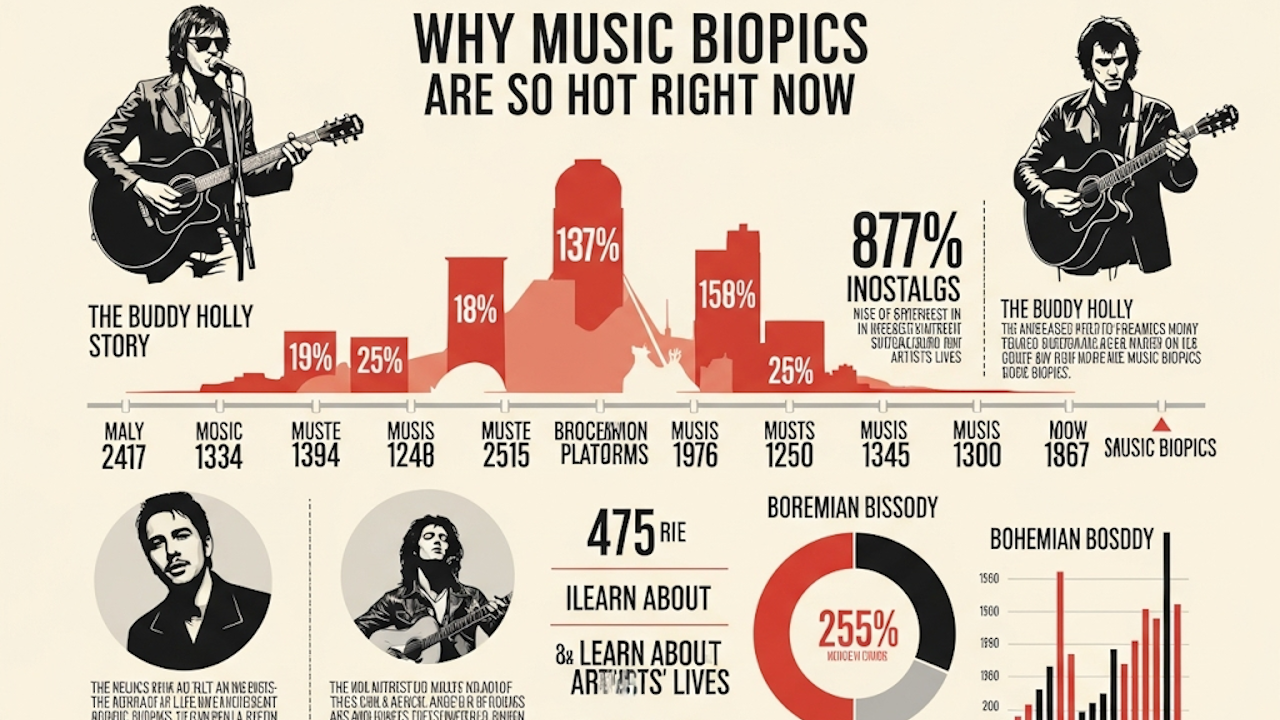In recent years, music biopics have exploded in popularity, drawing large audiences and critical acclaim. From “Bohemian Rhapsody” to “Elvis” and “Rocketman,” these films have become a staple of both the box office and awards season. But why are they so hot right now? The answer lies in a combination of nostalgia, storytelling, cultural fascination with fame, and the music industry’s deep emotional ties to our lives.
The Power of Nostalgia
One of the most compelling reasons for the surge in music biopics is the emotional pull of nostalgia. Audiences love to relive the music that shaped their youth. These films often focus on artists who peaked in the 60s through the 90s, tapping into the memories of older generations while introducing iconic music to younger ones. This shared experience bridges generational gaps and creates a powerful connection that other genres may not offer. The familiar songs serve as emotional anchors, helping viewers connect more deeply with the story on screen.
Star Power and Fan Bases
Music biopics come with built-in fan bases. If you’re making a movie about Freddie Mercury, Elvis Presley, or Aretha Franklin, you already have millions of fans worldwide who are eager to see their heroes portrayed on the big screen. This kind of loyalty translates into ticket sales. Moreover, casting high-profile actors to play these roles only adds to the allure. Think of Rami Malek in “Bohemian Rhapsody” or Austin Butler in “Elvis.” Their performances not only attract fans of the music but also those who admire the actors themselves.
The Appeal of True Stories
People are naturally drawn to true stories. They want to see how their favorite stars rose to fame, the obstacles they overcame, and the personal demons they battled along the way. Music biopics offer a behind-the-scenes look at lives that are often shrouded in mystery. These films strip away the glamour to reveal the humanity beneath the persona. Viewers get to see their idols as flawed, complex individuals, which makes the music even more meaningful. The rise-fall-redemption arc common in these films mirrors classic storytelling patterns, making them emotionally satisfying and relatable.
A Blend of Genres
Music biopics don’t just tell a story. They often include dazzling performances, stylish visuals, and dramatic plotlines, making them part musical, part drama, and part documentary. This blend appeals to a broad range of moviegoers. For fans of musicals, they offer toe-tapping set pieces. For lovers of drama, they provide conflict and emotion. For those who enjoy documentaries, they offer historical context and factual storytelling. This genre flexibility is part of what keeps music biopics feeling fresh and engaging.
The Impact of Streaming and Social Media
The rise of streaming platforms has also played a role in the popularity of music biopics. Services like Netflix, Amazon Prime, and Apple TV+ have invested heavily in music-related content, from series like “The Get Down” to documentaries like “Miss Americana.” These platforms allow for a more diverse range of stories to be told, including artists who may not have been considered big enough for a theatrical release. Meanwhile, social media has amplified interest by fueling fan speculation, behind-the-scenes content, and viral clips from these films. Buzz builds quickly when a film taps into collective nostalgia or features a breakout performance.
Awards Season Favorites
Another reason music biopics are thriving is that they tend to do well during awards season. Academy voters have a long history of favoring biographical performances, especially those involving transformation. From Jamie Foxx’s Oscar-winning turn as Ray Charles to Rami Malek’s win for playing Freddie Mercury, these roles often garner critical acclaim. The promise of awards attention can attract high-caliber talent, both in front of and behind the camera, which further elevates the quality and appeal of the films.
Cultural Relevance and Representation
In recent years, there has also been a push for more inclusive storytelling. Music biopics provide an opportunity to spotlight diverse voices and untold stories from different backgrounds and cultures. Films like “Respect” about Aretha Franklin and upcoming biopics about Latin and African American artists reflect this shift. These stories offer fresh perspectives while honoring the contributions of underrepresented communities to the music world. They are both timely and timeless, offering new heroes for a changing cultural landscape.
The Music Itself
At the heart of every music biopic is, of course, the music. Songs have the power to move us in ways that words alone cannot. When paired with cinematic storytelling, they can amplify emotional moments and create unforgettable scenes. A well-placed song can transform a simple narrative into something transcendent. Audiences leave the theater not just remembering the story but humming the tunes, feeling as though they’ve been part of something larger than life.
Conclusion
Music biopics are thriving because they offer a unique mix of nostalgia, emotion, and spectacle. They bring beloved icons to life, reveal the human stories behind the fame, and remind us of the power of music to shape lives and cultures. With streaming platforms expanding access and audiences hungry for authenticity and inspiration, the music biopic isn’t just a trend. It’s a modern storytelling powerhouse that is likely to stay center stage for years to come.

